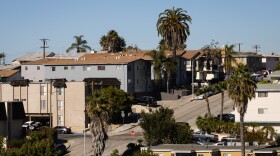Migration doesn’t stop after a presidential election.
On Wednesday, the same day Vice President Kamala Harris delivered her concession speech, activist Adriana Jasso welcomed migrants near the San Ysidro border crossing.
A group of women and children had crossed the border illegally just a few hours before Jasso arrived. One of them fell off the border wall.
“She’s in a lot of pain,” said Jasso, a project manager with the American Friends Service Commission.
The woman’s foot was extremely swollen. Her ankle was covered in black and purple bruises. As Jasso tended the wound, she couldn’t help but think of what lies ahead — another four years of Donald Trump in the White House.
“I don’t think it’s an understatement to say that people are feeling very, very concerned,” she said.
Tens of millions of Americans voted for a second Trump administration partly because of his tough-on-border message. On the campaign trail, promises of “mass deportation” were often met with enthusiastic applause.
But while Trump supporters celebrated, immigrant rights activists throughout the country mobilized.

The day after the election, Melissa Crow got a slew of messages from friends and fellow advocates expressing their support and solidarity. They included lawyers, policy wonks and organizers.
“I think it’s those deep connections that are going to get us through the next four years,” said Crow, the director of litigation for the San Francisco-based Center for Gender and Refugee Studies.
They’re coming up with strategies to block some of Trump’s harshest immigration policies. That includes filing lawsuits, building out mutual aid networks and advocating for more protections at the state and local level.
Crow is comforted by polls showing that, when framed as a choice, voters prefer a pathway to citizenship for undocumented immigrants over mass deportation by a large margin.

To people who were active during the first Trump administration, this feels like the second round of a boxing match, Crow said.
“We’ve been here before, we know what this fight looks like,” she said. “We’re more organized, we’re savvier and there’s a lot of solidarity.”
That fight will take place at all levels of government.
Jasso and other California-based activists are already planning a series of meetings in Sacramento next month. There they will lobby state lawmakers to increase protections for both documented and undocumented immigrants.
“It’s OK to be concerned,” Jasso said. “Everything that people are feeling is natural. It’s what makes us human beings.”
They hope to channel those feelings of fear and anxiety into meaningful change, she added.







